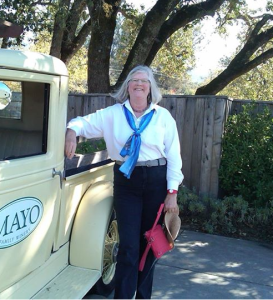Today SevenPonds spoke with Pat Macholl, a volunteer counselor with Legal Assistance for Seniors/Alameda HICAP. Her San Francisco-based office helps clients learn how to navigate their healthcare benefits through Medicare. Macholl teaches people about their benefits at the end of life, as well as preparations for retirement, across the county.
Marissa: Thanks for joining us, Pat. What made you get started in this career?
Pat: Well, I’m actually a volunteer. I went into retirement years ago, when I used to be a TV research director. I did not go gracefully into retirement (laughs). I’m not the type of person who can just sit around watching soap operas and eating candy. What got me started in this volunteer work was my friend. She mentioned that Medicare was looking for volunteers to help people navigate the complicated benefits system. I decided to try it, thinking it would be something to do to keep my mind sharp, you know, learning all of the training materials. What I soon realized is that Medicare is not that simple, it’s not that transparent for people who don’t know how to navigate the paperwork. People get their medical care from their insurance through their jobs, but when they approach that age for retirement, they don’t pay attention to what they need to do to keep their healthcare. It’s been an eye opening experience for me.
Marissa: In what way?
Pat: I saw people who had these good pensions, who always had medical coverage through their work, but who were shocked to discover the cost of medical care after they retired. Medical costs are a real shock. At least half of the people I see don’t make a tremendous amount of money in retirement, so it has an effect on them. I figured I’d just become an expert in the field, read through all of the manuals, but I was surprised to see just how many people I was helping. I have satisfaction in that.
Marissa: What do you do as a counselor?
Pat: We mainly do two things for people. First, I work on individual counseling sessions for people who are aging into Medicare, as they’re turning 65. A lot of them are still working, and want to know things like, “When I turn 65, do I have to sign up for Plan B?” “No, you don’t.” So I walk them through that process. We’re a nonprofit that operates on a county basis nationwide, so all of this is at absolutely no cost to the clients.
The second thing we do is help people who don’t have money to pay for prescriptions. I once had this soft-spoken, white-haired grandmother come into our office absolutely frantic. She owned the home she had lived in for years in San Francisco, but she was only living on $746 per month. She was also a breast cancer survivor with a lot of medical bills and doctor’s visits. She took public transportation to see us, and she sat in our lobby an hour before her appointment because she couldn’t drive herself there. What was amazing is that she thought she could handle paying for her medical expenses living on what little she had. In reality, she had no hope of paying for her bills. What she didn’t know is that she qualified for low-income benefits, and that she didn’t have to worry. We got everything handled for her. It was heartbreaking watching her try to live in this expensive city and pay her medical bills alone. She had no idea.
Marissa: Wow. And San Francisco has such a high cost of living! Do you find that a lot of people have trouble understanding the benefits they have?
Pat: Oh yes. The other part is that we get a full spectrum of intelligences that come through our doors. I have to be aware of all different communications styles when I work with people on understanding their eligibility. Are they fluent in English? You never really know until your client comes in, so that affects how well we communicate. Now, I’m 68, and I know that hearing impairment, sight impairment and cognitive abilities can change and affect your ability to cope with these sort of issues, especially as we get older. I had to learn how to communicate with non-verbal cues as well. The other part of it is, will there be a cultural difference? I’m an elderly, white, college-educated female, but I need to be prepared to understand where all of my clients are with their communication and background. Whether they’re from India, China, Thailand or what have you, I need to explain this complicated system, and sometimes that involves using a translator. That can get complicated, because I never know exactly how the translator is communicating what I’m saying.
Marissa: Why do you think Medicare is such a complicated system for the average person to navigate on their own?
Pat: First of all, as a country, we expect our employers’ group health plans to cover our needs. We don’t pay attention to our insurance because we never had to in the past, if we had good coverage through our work. The second part is that we have a multitude of choices that can become bewildering. I deal with this stuff every day, so it’s become rote to me. This is not within the normal scope for most people though. It gets frightening, especially when you’re dealing with paying these huge bills. They need somebody to sit there with them and explain things. The third reason is that most people have no clue how to read their explanation of benefits that comes in the mail.
That has nothing to do with intelligence, either. I knew a woman who had a Master’s degree who was absolutely brilliant. She once had an explanation of benefits mailed to her that was 45 pages long. Now, I can barely operate my smartphone. I always say, the phone might be smart, but it has a dumb owner (laughs). So here is this intelligent, educated woman who is panic-stricken because she can’t figure out this paperwork, and it took me 45 minutes to get through all of it, even with all of the specialized training I have. The main thing I want people to know is that they’re not idiots if they don’t know how to read this stuff. There is help. We have a cadre of people out there who have taken the time to learn this system, and our clients don’t have to walk alone.
Stay tuned for the second half of our interview with Pat next week, where she talks about how to get help for Medicare benefits in your county.

 How Do You Navigate Your Medical Benefits After Retirement? An Interview with Pat Macholl, Part One
How Do You Navigate Your Medical Benefits After Retirement? An Interview with Pat Macholl, Part One




 Funeral Home Owner Chris Johnson Spending Halloween in Jail
Funeral Home Owner Chris Johnson Spending Halloween in Jail
 Our Monthly Tip: Toast a Loved One with a Personalized Glass
Our Monthly Tip: Toast a Loved One with a Personalized Glass
 My Cousin’s Death Taught Me the Meaning of Life
My Cousin’s Death Taught Me the Meaning of Life














